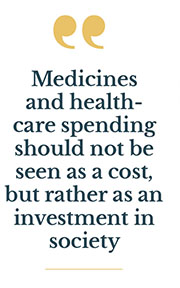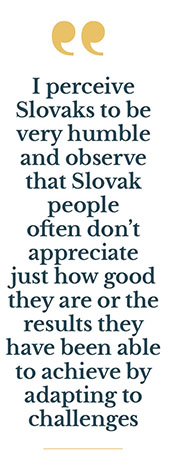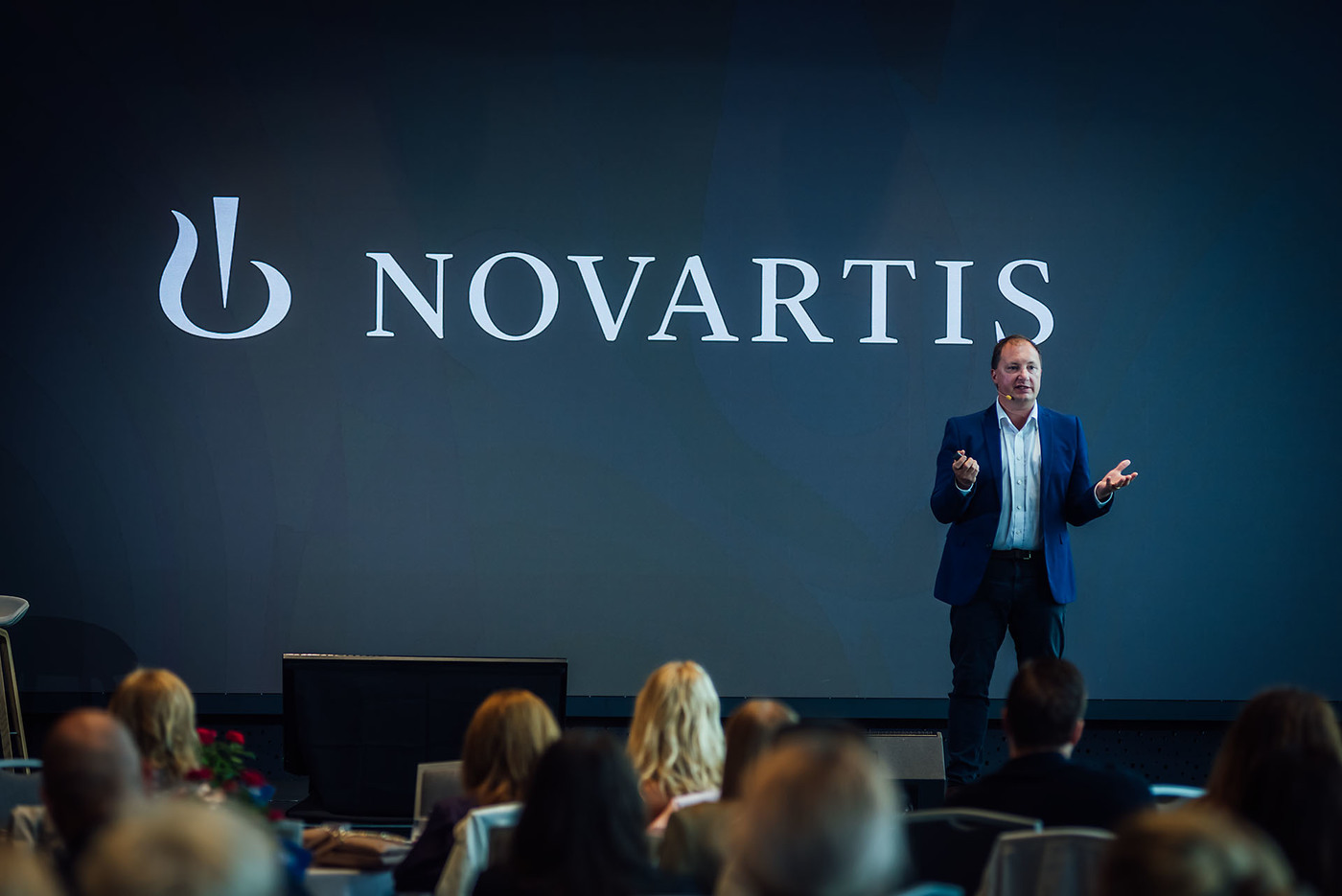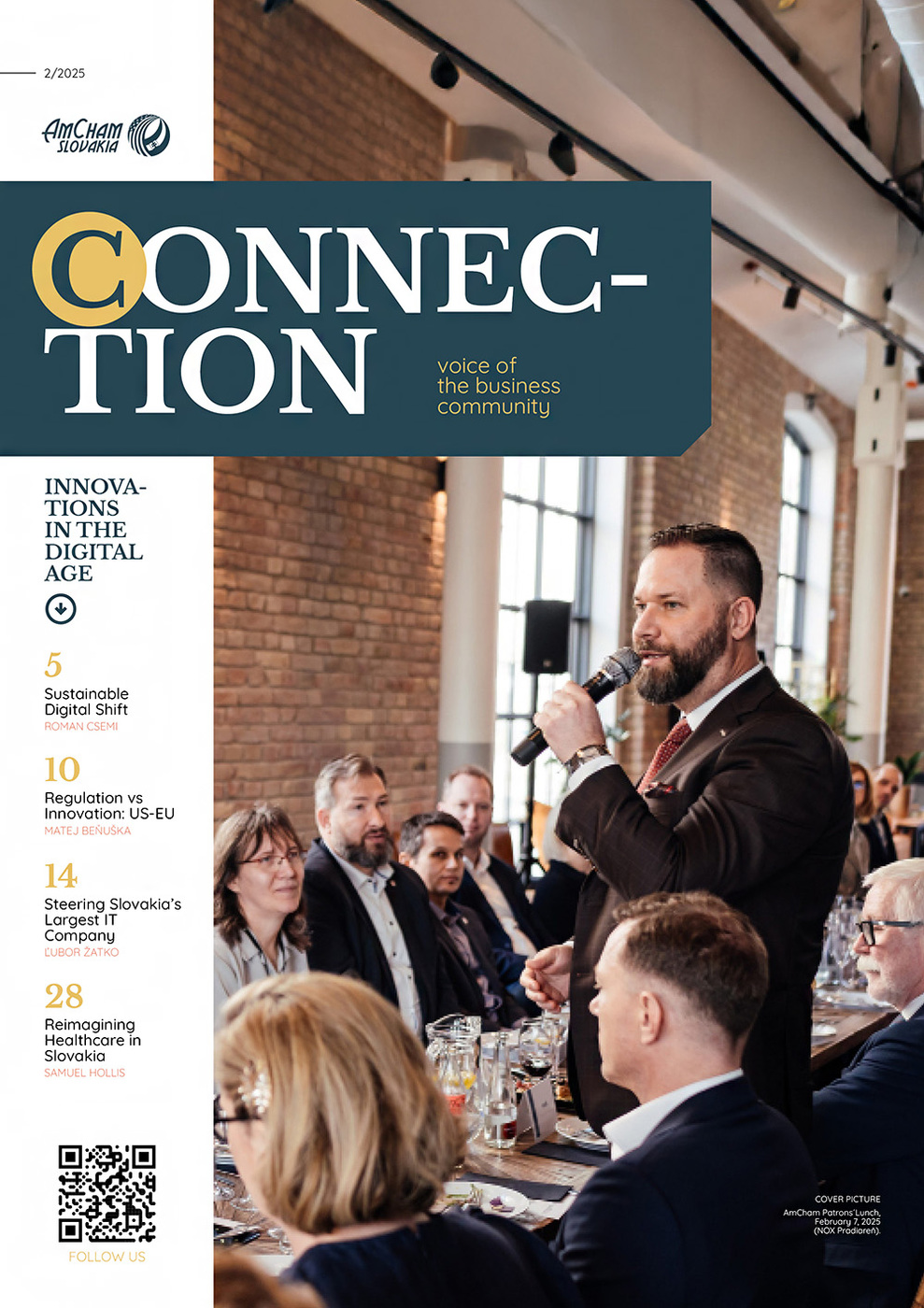What inspired you to pursue a career in the pharmaceutical industry? What continues to drive your passion and commitment to this field?
While growing up, I was fascinated by how the body works and how it heals (particularly when I was recovering from my many rugby injuries), so I knew I had a passion for science. I completed an undergraduate degree in Biology at the University of Warwick and then a post graduate degree in Pharmacology at Kings College London. Then, I knew I wanted to continue working in science to combine this passion with a career. Today, I continue to work in the industry because I see the scale of impact we make on patients and their families when we get it right. Equally, as a fan of team sports, I love the general management roles I have been in recently, in which I have opportunities to support teams and individuals and help them unlock their potential and achieve things they never thought possible.
In April, it will be a year since you moved to Slovakia from the UK. What have been your most memorable experiences and challenges since taking on this role?
The role is giving me the chance to share experiences from my previous work in the US, UK and Switzerland here in Slovakia, but equally I am learning from the creativity and resilience of my colleagues here. During 2024, I was elected to the AIFP Supervisory Board (the trade association for the pharmaceutical industry) and I am working with AmCham in Slovakia. This has been a great learning experience for me and has provided a chance to represent members in shaping the healthcare system and reimagining medicine in Slovakia, where the average life expectancy is 3.5 years lower than the EU average.  The challenges I have observed regularly in Slovakia come down to finances, as they often do in other countries too. Medicines and healthcare spending should not be seen as a cost, but rather as an investment in society. I have spent time in discussions with various stakeholders in the local healthcare sector to reinforce that, in many cases, investing in medicines or improved patient pathways in the short term can help save precious finances in the mid and long term. Also, importantly these investments enable some patients to recover and return to being productive in society, which supports the economy.
The challenges I have observed regularly in Slovakia come down to finances, as they often do in other countries too. Medicines and healthcare spending should not be seen as a cost, but rather as an investment in society. I have spent time in discussions with various stakeholders in the local healthcare sector to reinforce that, in many cases, investing in medicines or improved patient pathways in the short term can help save precious finances in the mid and long term. Also, importantly these investments enable some patients to recover and return to being productive in society, which supports the economy.
How does the business environment in Slovakia differ from the one in the UK?
In Slovakia it is certainly more dynamic; things can change every day politically and financially right now, so teams need to be flexible and resilient. I have also observed in the workplace more regular comparisons with neighboring countries on how things are delivered or financed. I know this can be useful in some circumstances, but personally I believe this is not always healthy as each country has its own dynamics. Spending time handpicking comparisons can distract teams from solving the real challenges impacting the country. I perceive Slovaks to be very humble and observe that Slovak people often don’t appreciate just how good they are or the results they have been able to achieve by adapting to challenges. So, I have often found myself acting as a cheerleader, encouraging my Slovak colleagues to showcase their work to others around the world through our multinational company. I feel this humility and self-deprecation (however charming) can hold Slovak colleagues back as they may assume no one would be interested. This is quite wrong, as many countries could benefit from seeing examples of best practice from similar sized nations.
In your opinion, what are the most significant advancements in the pharmaceutical industry in the last decade?
As I approach the end of my second decade in the pharmaceutical industry, I would say the greatest progression is access to better data sets and in making more data driven decisions. When I first started in this industry, many decisions were driven by gut feeling or relationships. Now, we use data to make smarter and more informed decisions about the investments we make and the channels we utilize to bring medicines to healthcare professionals and ultimately their patients.
I have also seen an enormous change in the self-regulation we appropriately impose on ourselves as an industry, helping to ensure we operate at the highest standards, with integrity and transparency, and build trust with all our partners. At Novartis our vision is to be the most valued and trusted medicines company in the world.
How does Novartis stay at the forefront of innovation in the highly competitive pharmaceutical industry?
I believe Novartis has prided itself, for many years, on not just following trends. Instead, we have often done the hard things that some other companies shy away from. We have become pioneers in finding ways to progress science; often being the first to invest in and commit to new scientific platforms and technologies, like cell therapies, gene therapies and radioligand therapies. This is always coupled with having brilliant people and empowering them to be curious and inspired when they come to work. Without brilliant people doing brilliant things there is no progress. How is Novartis leveraging new technologies, such as AI and data analytics, to improve patient care?
How is Novartis leveraging new technologies, such as AI and data analytics, to improve patient care?
For context, it can take around 14 years and cost on average $2.3bn to bring a medicine to patients, from the initial identification of a molecule through trials and regulatory processes. Only 14% of the assets in early trials get to the market to benefit patients. So, utilization of technologies to improve the speed, success rate and cost of bringing medicines to patients is essential. Novartis already utilizes technologies to help us become more efficient at identifying targets and molecules, screening thousands in minutes instead of days or months as it used to. We are also using digital to improve real-time tracking in supply chains, to ensure personalized medicines can reach patients precisely when needed and reduce waste. Plus, we are reaching healthcare professionals through digital channels (we have recently launched a web-portal for healthcare professionals in Slovakia). These are just a few examples, but also internally we utilize AI to aid supply and sales forecasting, helping to release time for staff to better spend on delivering impact for patients, versus getting lost in Microsoft Excel for weeks on end.
How does Novartis collaborate with local academic and medical institutions in Slovakia to drive healthcare advancements?
I am a strong believer in purpose-led collaboration. This is not just a buzzword; it is a strategic approach where all stakeholders come together with a clear, aligned goal and the relationship is built on mutual trust. For the goal to be meaningful in healthcare it should revolve around improving patient outcomes, advancing medical science or addressing a specific healthcare challenge. I believe strongly that the future of healthcare lies in better utilizing the best capabilities, resources and channels to reach audiences across all collaborating partners, to help bring innovation to society at scale.
Novartis Slovakia supports multiple projects working with both medical institutions and academia, often to help generate or analyze existing data to better identify the areas of need in this country. We have 45 clinical trials currently ongoing in Slovakia that are directly related to innovations for the future. We believe these collaborations are the best way to progress the science together.
What do you believe will shape the future of healthcare?
I feel strongly that better sharing of data across collaborating partners, corporations and governments will ensure we can find ways to reach patients in the best way possible. This is not just to treat disease but to prevent some conditions taking hold of individuals and their families in the first place, and to have a subsequent positive impact on society economically.
But more than data, it is people that will impact healthcare and patients the most. All the innovations and the technologies are meaningless unless we have inspired people working in healthcare that want to make a meaningful difference to reimagine medicine and leave a legacy in society.

Content ID: FA-11394992
Approved: 04/2025
The creation and publishing of this article was supported by Novartis.
Samuel Hollis, Country President, Novartis



Follow us